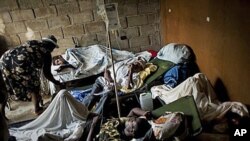Today, it takes roughly half the time to discover and report a new disease outbreak than it took in 1996 – evidence that the disease surveillance system is getting better at identifying new threats sooner.
Public health agencies are continually on the lookout for outbreaks of infectious disease. The fight against influenza, SARS, ebola, and others can be more effective when doctors and scientists get a head start in the battle.
John Brownstein of Children's Hospital Boston and Harvard Medical School says that works out to a better than six percent improvement annually.
"What we see is that in the mid 90s, for instance, it might have taken a few months to find an outbreak of cholera or unusual influenza virus," he explained. "Currently, it may only take a couple of weeks. And so that's a real improvement in surveillance. However, I do believe we can still do better than that."
That might especially be true in Africa, where half the new disease outbreaks occur, but where the speed of discovering and reporting new outbreaks showed the least improvement.
Although his study doesn't directly address the question, Brownstein has been studying disease reporting for a while, and he suggests why some officials might be reluctant to hurry up and report outbreaks in their countries.
"It's very important to note that identifying a particular disease, especially one of public health significance, can be very damaging to a country. It can have implications for tourism and trade, and so there is this tradeoff as far as being open about public health events and the subsequent economic impact," he said.
Governments may be reluctant to report disease outbreaks, but individual citizens might fill the gap with so-called informal reporting. Until recently, Brownstein says, he and his colleagues were looking at Internet applications to facilitate that, but lately they're focusing on tapping into the increasing penetration of mobile phones in resource-poor countries.
"And so a lot of our work now and for the next few years can be focused on ways in which we can get disease reporting via cell phones – whether it's SMS or through smart phones,." he said. "And so I think there is a real opportunity to really bring improvements, especially in regions of the world where there's been a lack of improvement in surveillance efforts."
John Brownstein and his colleagues describe the improved speed in reporting disease outbreaks in the Proceedings of the National Academy of Sciences.




